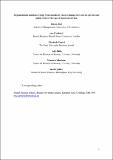Organizational tensions arising from mandatory data exchange between the private and public sector : the case of financial services
Abstract
This paper examines the organizational tensions arising from mandatory data exchange initiatives between private and public organizations. The focus is the UK financial services sector, which is required to monitor and report on customer identities and transactions under the country's Anti-Money Laundering/Counter-Terrorist Finance (AML/CTF) regulations. The transferred data are generated from existing organizational activities, systems, processes and working patterns; we examine how government demands for such data affect commercial priorities, customer relationships and working patterns in the sector. We adopt an exploratory approach to investigate this phenomenon, consisting of 16 in-depth interviews, analysis of documents and two case studies. Three contributions are made. First, we use remediation theory to show that existing organizational arrangements are reconfigured at multiple analytical levels, creating tensions between the organizations’ commercial and compliance roles. Second, we establish the information flow as an appropriate unit of analysis in the study of data exchange mechanisms and reveal the flows that characterise AML/CTF compliance for financial services organizations. Finally, we adopt a ‘set theoretic’ perspective on multi-level organizational research, to argue that the multi-level effects of this regulation can be examined in parallel.
Citation
Ball , K , Canhoto , A , Daniel , E , Dibb , S , Meadows , M & Spiller , K 2020 , ' Organizational tensions arising from mandatory data exchange between the private and public sector : the case of financial services ' , Technological Forecasting and Social Change , vol. 155 , 119996 . https://doi.org/10.1016/j.techfore.2020.119996
Publication
Technological Forecasting and Social Change
Status
Peer reviewed
ISSN
0040-1625Type
Journal article
Description
The research featured in this paper was funded by a Leverhulme Trust Project Grant, no. F/00269/X.Collections
Items in the St Andrews Research Repository are protected by copyright, with all rights reserved, unless otherwise indicated.

